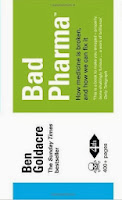"Me Medicine vs. We Medicine: reclaiming biotechnology for the common good".
Donna Dickenson. Columbia University Press, New York. 2013.
The key premise of this seductive book by Donna Dickenson is that 'we medicine' - medicine aimed at maximizing the health of the nation, and 'me medicine' - medicine customised for individual patients, are mutually exclusive. The author, an Emeritus Professor of Medical Ethics and Humanities at the University of London, chooses to focus on new molecular diagnostics, including pharmacogenetics and pharmacogenomics, as the major relevant examples of personalised medicines. The author bases much of her argument on her perception of the polarity that 'genetics and genomics reveal more profound truths than other sciences'. However there is no clinical consensus that these are disciplines that operate in isolation. Genetics and genomics complement other medical sciences.
Good therapeutic practice concerns applying a wide range of clinical and laboratory tools to select the right drug(s) for the right disease and the right patient, at the right time, at the right dose, by the right route of administration, and for the right duration. Personal biomarkers of treatment response which should be used as a regular part of good medical practice include age, gender, ethnicity, lifestyle, co-morbidity, concomitant prescribed and non-prescribed regular and occasional medicines, and key lab phenotypes, such as renal and liver function, in addition to emerging pharmacogenetic and pharmacogenomic tests. By using these tools to apply a personal approach to patient management, prescribers are more able to select effective treatment options, and less likely to select treatments that may cause serious adverse effects ..
For more, see my review in Pharmacology Matters, a publication of the British Pharmacological Society.
Search This Blog
Friday, 29 November 2013
Friday, 8 November 2013
Drugs and Pharma: a matter of trust?
Medicines have significant costs, both financial and in terms of
serious adverse effects. Treatment
should therefore only be prescribed and continued when the benefit outweighs the risk. This presupposes that health professionals, patients, and policymakers have trustworthy evidence to support clinical use of medicines.
It is vital that research on medicines is objective in order to show whether proposed treatments are effective for improving clinically meaningful outcomes for patients, how they compare to existing remedies, and the relative and absolute cost implications of adopting the treatment.
In his seductive polemic Bad Pharma, psychiatrist and 'Bad Science' Guardian columnist Ben Goldacre raises major concerns about the quality of evidence on the efficacy and safety of specific drugs and classes of treatment in clinical use. His book has added to recent public concern about medicines, their safety, and the probity of pharmaceutical companies.
This background concern for the public has been inspired both by works of fiction, for example the film Side Effects, set within a corrupted psychotherapeutic sector, and John Le Carre's African novel The Constant Gardener, which raises important questions about the ethics of clinical research on anti-infective agents in developing countries.
And by a series of very large fines imposed on major pharmaceutical companies for a wide range of reported major errors of omission and commission, including concealed data on safety, and encouragement of doctors to prescribe off-licence, i.e. to patient groups for whom there is no or insufficient evidence on effectiveness or safety of medicines.
See more in reviews in the Reinvention Journal
Ben Goldacre Bad Pharma: How drug companies mislead doctors and harm patients.
London: Fourth Estate. Reprinted with edits: February 5, 2013 | ISBN-10: 0865478007 | ISBN-13: 978-0865478008
should therefore only be prescribed and continued when the benefit outweighs the risk. This presupposes that health professionals, patients, and policymakers have trustworthy evidence to support clinical use of medicines.
It is vital that research on medicines is objective in order to show whether proposed treatments are effective for improving clinically meaningful outcomes for patients, how they compare to existing remedies, and the relative and absolute cost implications of adopting the treatment.
In his seductive polemic Bad Pharma, psychiatrist and 'Bad Science' Guardian columnist Ben Goldacre raises major concerns about the quality of evidence on the efficacy and safety of specific drugs and classes of treatment in clinical use. His book has added to recent public concern about medicines, their safety, and the probity of pharmaceutical companies.
This background concern for the public has been inspired both by works of fiction, for example the film Side Effects, set within a corrupted psychotherapeutic sector, and John Le Carre's African novel The Constant Gardener, which raises important questions about the ethics of clinical research on anti-infective agents in developing countries.
And by a series of very large fines imposed on major pharmaceutical companies for a wide range of reported major errors of omission and commission, including concealed data on safety, and encouragement of doctors to prescribe off-licence, i.e. to patient groups for whom there is no or insufficient evidence on effectiveness or safety of medicines.
See more in reviews in the Reinvention Journal
Ben Goldacre Bad Pharma: How drug companies mislead doctors and harm patients.
London: Fourth Estate. Reprinted with edits: February 5, 2013 | ISBN-10: 0865478007 | ISBN-13: 978-0865478008
Subscribe to:
Comments (Atom)
